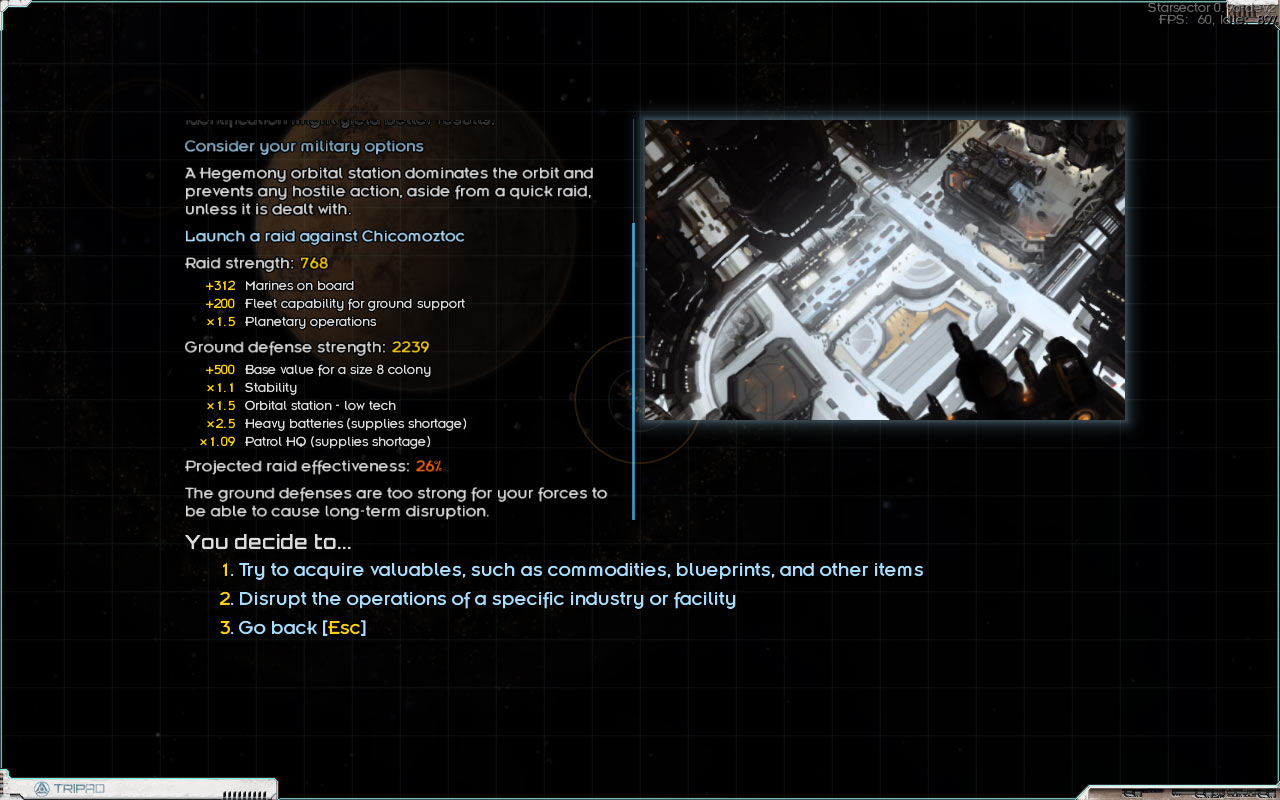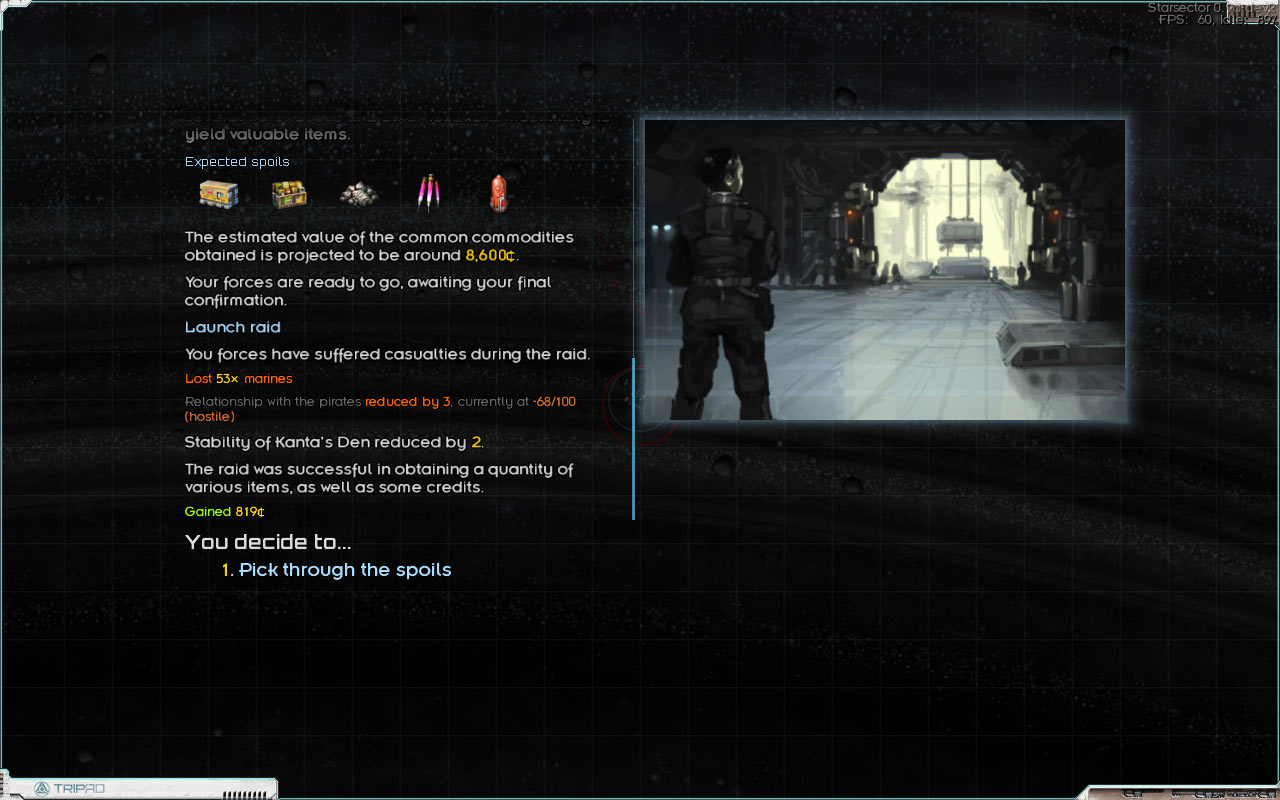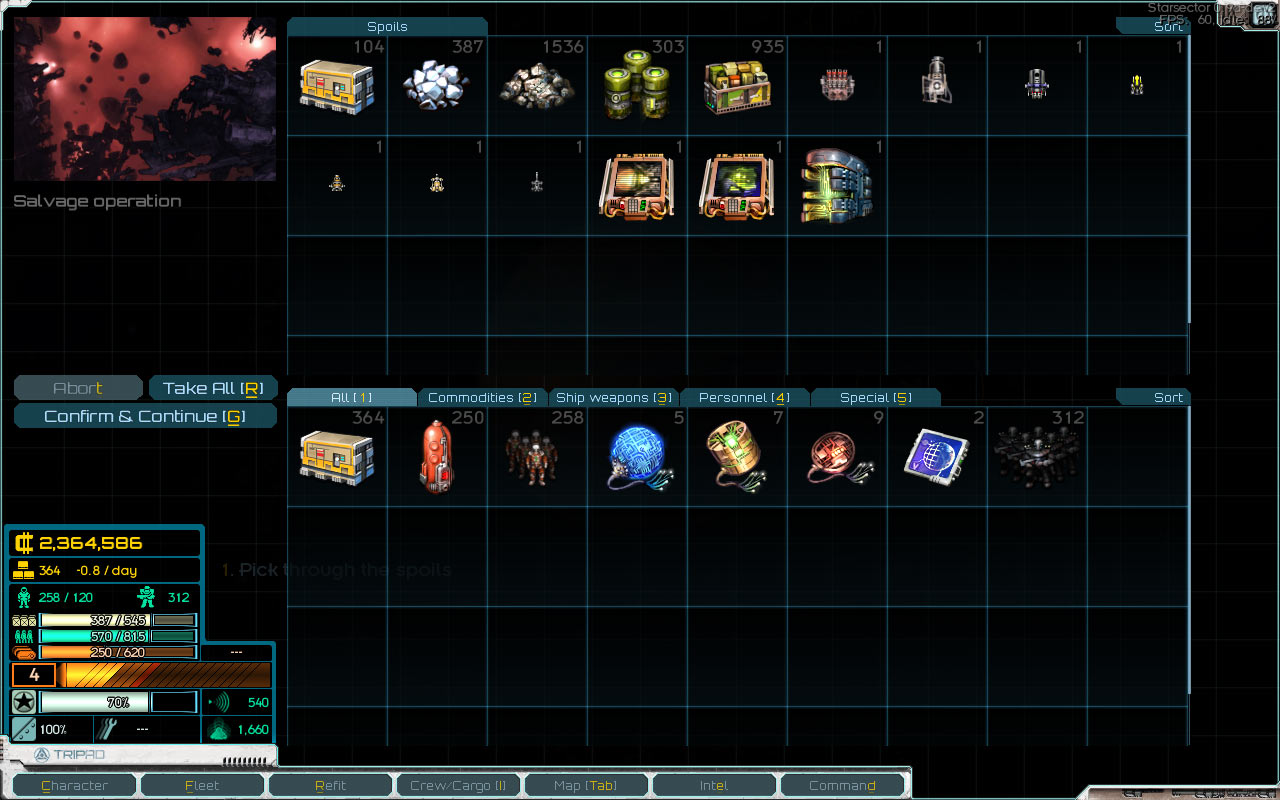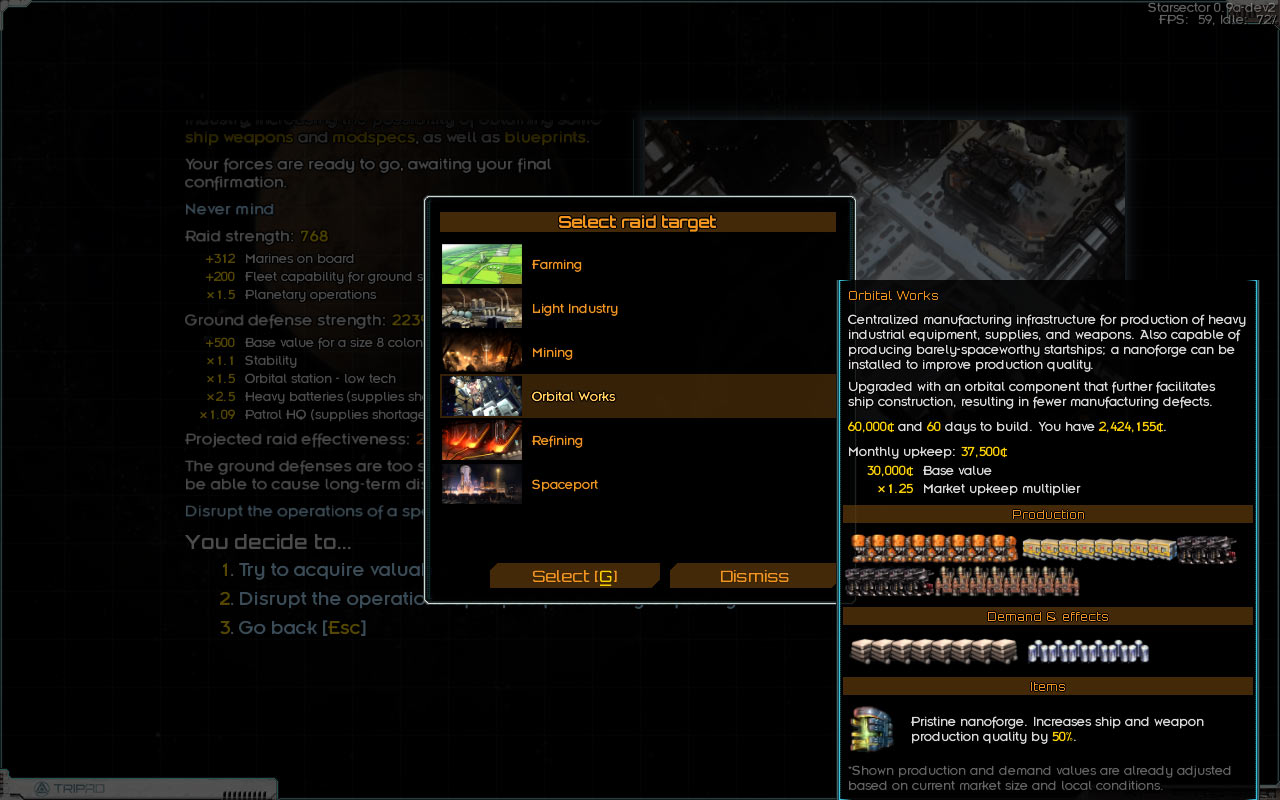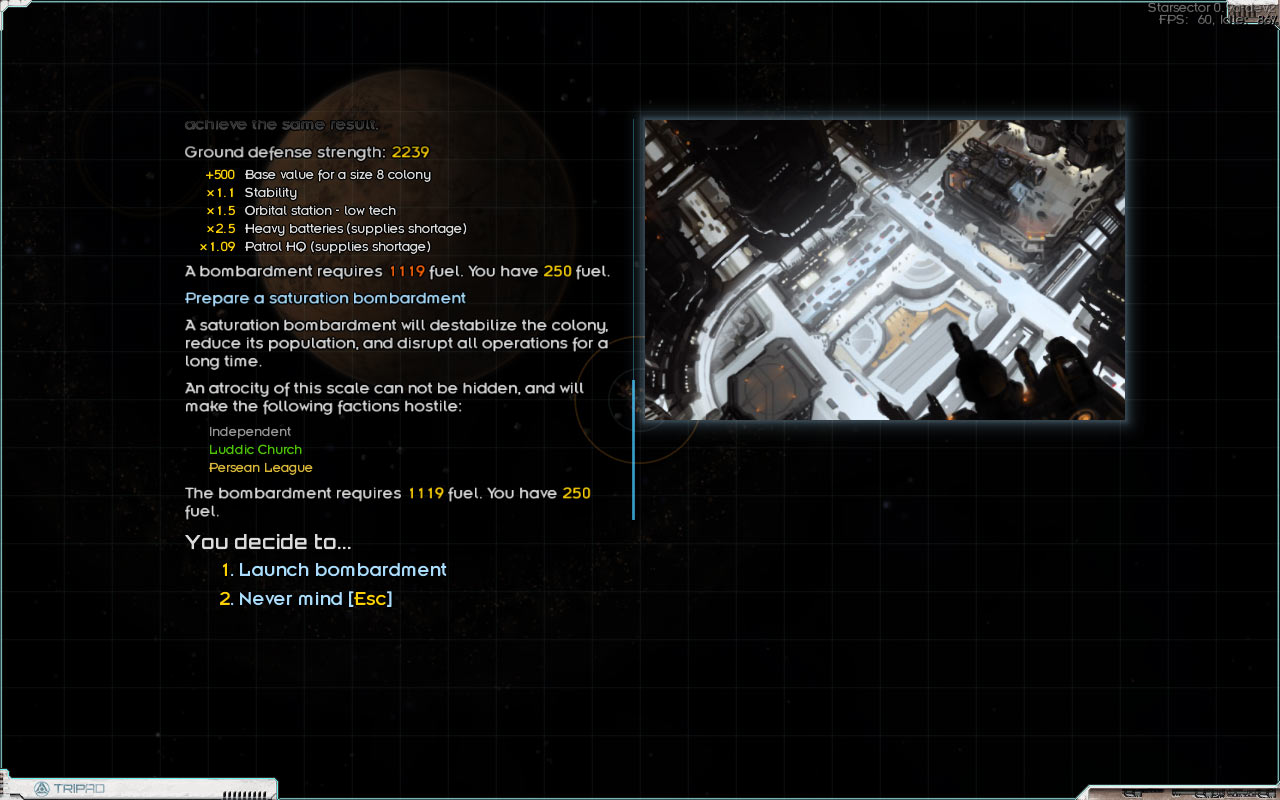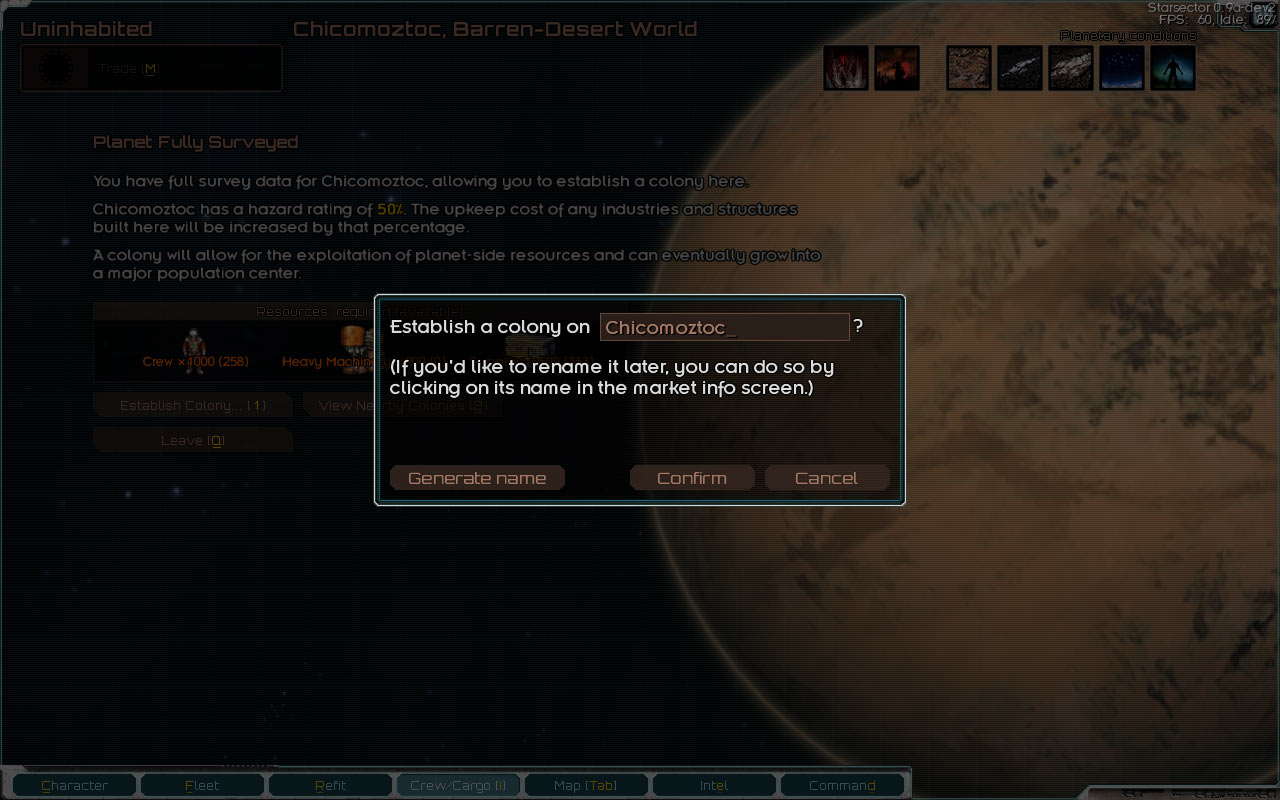Raids, Bombardments, and Planetary Defenses
Ever since reading Space Viking, I’ve wanted to add planet-raiding to Starsector. Of course, one simply doesn’t add a feature because one has read about something cool; we need to have good reasons for adding raiding to the game, and in particular for adding it for this release, which already has quite a lot of stuff in it.
What makes it necessary at this stage? The new economy system allows the player to generate a constant income stream by becoming the best supplier of, say, fuel or transplutonics. One way to do that is for them to build up their own operation and improve its accessibility. The flip side is knocking the competition down a peg or two, and raiding is a natural fit here.
So, that’s the main reason – but adding a new feature also presents an opportunity to make other improvements to the overall design.
After establishing the main goals, it’s natural to move on to the question of choices. After all, a game is more or less just a series of interesting choices. “What interesting choices does raiding offer to the player?”, then, seems like a reasonable starting point. Unfortunately, it’s a lazily phrased question, and that could get us in trouble.
What’s hidden by the question is that there are two fundamentally different categories of choices here. One set is choices to do with the raid itself – for example, how many marines to send, whether to send reinforcements at a critical juncture, or other tactical options. The other set is more zoomed out – raiding itself is a choice, as is picking a type of raid from a set of options with different strategic goals.
Tactical Options
Let’s talk about tactical options first, since that’s where the question originally (mis)led me. Having tactical options implies that the player can do a good or bad job of a raid, presumably affecting its effectiveness. So, what are the possibilities?
First off, it’s possible that there’ll always be a “right” choice to make. That’s bad; if that’s how it works out, why offer choices in the first place? The better result (rather obviously) is if the choices are deep enough that doing well tests the player’s skill in some way – whether it’s logic, reactions, etc. In that case, we’re talking about a mini-game.
Coming up with a compelling mini-game is challenging – enough so that it’s probably a bad idea just based on that alone – but suppose we got that for free. Would it be a good thing? I’m fairly certain the answer is still a resounding “no”, because:
- It’s testing some sort of skill which some players will possess and some won’t. It’s probably tangential to the rest of the game, so it’s adding a barrier to enjoying the game for the players that don’t happen to be good at it.
- How do we tie it in to the rest of the game? Do we assume that the raid is always performed at an “average” level of skill? No matter what the answer is, it’ll cause a balancing headache, since different players will perform differently. This, of course, can be worthwhile if the skill being tested is a “core” skill for the game (e.g. how the game handles ship-to-ship combat), but if we’re talking about a mini-game, that’s a lot of trouble to go through.
This is a general argument against mini-games; there are of course exceptions, but I think it very much holds here. Puzzle Pirates is a notable case where the mini-games do work very well – but then the whole game is built around mini-games, and being good at them is very much a “core” skill for that game.
To make a long story short, I think having tactical choices at all would be a bad idea. It either doesn’t add much or it adds problems.
Thus: the choices offered by raiding should be about why you’re raiding, not how you’re doing it.
With that in mind, let’s dive into how raids (and bombardments, which are an extension of raids, at least in terms of the design) actually work.
Overview
Let’s start with a rough outline for how this all works. A raid can either acquire various valuables, or target and disrupt a specific industry or facility on the colony, such as, say, a mining operation or a spaceport. Raiding requires marines.
Bombardments are all about doing long-term damage to the colony – without the surgical precision of a “disruption” raid – and require large amounts of fuel. (<handwave> antimatter <handwave> destabilized fullerenes <handwave> dispersal pattern in the upper atmosphere <handwave>)
The presence of military fleets makes both raiding and bombardments impossible. An orbital station makes bombardments impossible, but can’t prevent raids. Finally, all colonies have some amount of ground defenses, which make both raids and bombardments more difficult.
The idea here is that there are layers of defenses, which – as they’re stripped away – open up more offensive options.
Raid Effectiveness
Colonies have a “ground defenses” rating, which combines a base value based on the colony size with various modifiers. Building “Ground Defenses” or “Heavy Batteries” increases it, as does having an orbital station or a military base. A colony’s stability also affects its defensive strength.
On the attacking side, the raid’s strength is based on the number of marines in the fleet. A “planetary operations” skill increases raid strength, and the Valkyrie-class troop transport finally has a mechanical role – it’s got a “Ground Support Package” hullmod, which increases raid strength as well.
The raid strength is compared to the ground defense strength to produce a “raid effectiveness”, which ranges from 0 to 100%. Values on the high end of that indicate that defenses are entirely outclassed; a more average/decently effective raid would be at around 50%.
In addition to their other effects, all raids temporarily reduce the stability of the targeted colony (which has various negative effects), and reduce your standing with the faction that owns the colony. It is possible, however, to conduct a “stealth” raid with your transponder off, which still results in a reputation penalty, but does not make the faction immediately hostile.
Since we don’t want tactical options such as picking the number of marines to use, the raid’s strength is based on the total number of marines in the fleet. However, it’s important to ensure the player doesn’t want to pick the number of marines to use in the first place. We can achieve this by making sure having more marines is always strictly better. In particular, having more marines always ensures lower casualties (if any), and there is no other cost based on the number of marines that the player would want to reduce by using less of them.
Because an orbital station increases the strength of the defenses but does not prevent a raid, there’s a choice of whether to take down the station first or not, and an incentive to do so.
Raiding for Valuables
This is your typical smash and grab. Higher raid effectiveness increases the value of the commodities acquired. As far as how it fits into the larger game design, there are two points:
1) It gives a reason for fighting – if you’re able to defeat the patrols around a colony, which might not itself be particularly profitable, a raid for valuables can serve as a nice reward, and indeed the reason for doing this in the first place. So, it serves as yet another mechanic that funnels the player towards combat; something that I think most campaign-level mechanics should do, either directly or indirectly.
2) When raiding a production center, it’s possible to gain ship, weapon, and fighter blueprints the faction has access to. Normally, you would acquire blueprints through exploring the fringes, but there’s no guarantee that a blueprint for everything will be available – in fact, the opposite is true, and what is available will shape the feel of a particular campaign. But, if you really, really want the blueprints for a specific ship, this aspect of raiding acts as a fail-safe to ensure that’s at least possible, provided at least one faction has access to it.
It’s also possible to acquire modspecs and special items in use at the colony, so it’s one more way to gain access to these things.
Raiding to Disrupt
This is the “knock off the competition” option. You can select a specific industry (or structure/facility) to raid, and it will be disrupted – i.e. entirely non-functional – for a long time, with the exact duration based on the raid’s effectiveness.
Some industries/facilities can’t be disrupted. For example, you can’t disrupt an orbital station or ground defenses. In-fiction, this is because military targets are too difficult to attack in this way. In terms of mechanics, it’s because being able to do this would allow the player to too-easily circumvent the various planetary defenses.
A disruption raid also requires a certain minimum raid effectiveness. Since disruption is binary – a target is either disrupted or it isn’t – it makes sense to prevent a one or two marine raid from bringing down an entire industry, however briefly.
Repeated Raiding
If anything is profitable, it’s a good bet players will want to keep doing it – so, we’ve got make sure that raiding isn’t a source of infinite profit.
Firstly, each raid adds a temporary and cumulative “increased defender preparedness” bonus to the ground defenses. The bonus is quite high, and means that raid effectiveness will go down quickly with each successive raid. This in turn results in both reduced loot and increased casualties, making repeated raids unappealing beyond a certain point.
Secondly, there’s a brief cooldown after each raid – it takes about a day to organize another one. This helps prevent repeated raids if, say, you’ve just barely snuck by a patrol. Having to hang around for a day changes the risk/reward calculus of keeping at it.
I’m not sure the cooldown is strictly necessary mechanically, but it does feel more right not to be able to launch repeated raids without ever leaving the planet interaction dialog. Still, I’ll keep an eye on that part of it.
Thirdly, raiding for valuables will cause increasing shortages of the commodities you’re taking, which in turn results in less spoils for the next raid, so there are natural diminishing returns in play.
Tactical Bombardment
A tactical bombardment disrupts all military infrastructure at a colony, and reduces its stability. In particular, it may make sense as a precursor to a raid, since it will reduce ground defenses. However, the high fuel cost – based on the ground defense strength – should make very situational rather than automatic.
In addition, unlike a raid, a tactical bombardment will always make the colony’s faction hostile – there’s simply no way to hide something that big. So, it’s not something a transponder-off “stealth” raid can take advantage of.
Saturation Bombardment
A saturation bombardment targets all human activity at a colony. It’ll disrupt all operations, tank the colony’s stability, and reduce the colony size by one point.
Being considered an atrocity, it will make multiple factions – ones that care about this sort of thing – instantly hostile. So, while it could be looked at as an extreme way of eliminating the competition for your, say, second-rate cabbage farming operation, it’s not particularly useful at that as most of the prospective buyers would shoot you on sight – and that’s before trying the cabbages.
The fuel cost for both types of bombardments is the same. If saturation bombardments cost more, it’d create an awkward situation where it might cost less total fuel to do a tactical bombardment (to reduce ground defenses) and then do a saturation bombardment at a reduced cost. Even if the costs were tuned so that this wouldn’t happen, it would still raise that question for the player, so it seems simpler and less troublesome all around for both types of bombardments to have the same cost.
That cost is also quite high. I don’t expect bombardments of either sort to be particularly common – there will of course be some situations where they make sense, but in general the high cost serves more to explain why bombardments aren’t commonplace. (“Why didn’t the pirates bombard your colony after your ground defenses held off their raid? It literally wasn’t worth the expense.”)
On that note, ground defenses don’t actually reduce the effect of bombardments, but only make them require more fuel – in practice preventing them by making them too expensive.
Decivilization
A colony that’s been too unstable for too long runs the risk of becoming decivilized. In particular, a world that suffered a saturation bombardment is quite likely to go down this road rather than recover.
Mechanically, a decivilized colony becomes just like a world you might find on the fringes, with a “decvilized” condition, that a new colony could be established on.
I don’t expect this to play a particularly large role in this release – except as a bit of a check on too-rapacious raiding, or perhaps a surprise of the “actions have consequences” variety, but it should tie into some other mechanics later.
Invasions
… are not in the next release, but it makes sense to talk about them now, since it’s very much a related topic. In brief: I’ve got some fairly specific ideas that I’d like to try, but there’s no compelling reason to put them into this release. I’m also not 100% sure they’ll be in the game at all – right now I think they will be, and I’d even say it’s likely, but I’ll really have to see exactly how it pans out and what role they play before I can be sure.
Dev Status
This should be the last major feature for the .9a release! There’s still a lot of minor stuff to clean up, but I’m hoping to get into playtesting fairly soon. Given the scope of this release, that’ll probably take longer than usual, too, but still – progress!
Comment thread here.
Tags: bombardment, cabbage farming, colony, decivilized, disruption, ground defenses, h beam piper, i just don't like minigames ok, marines, orbital station, planetary shield, raid, space viking
